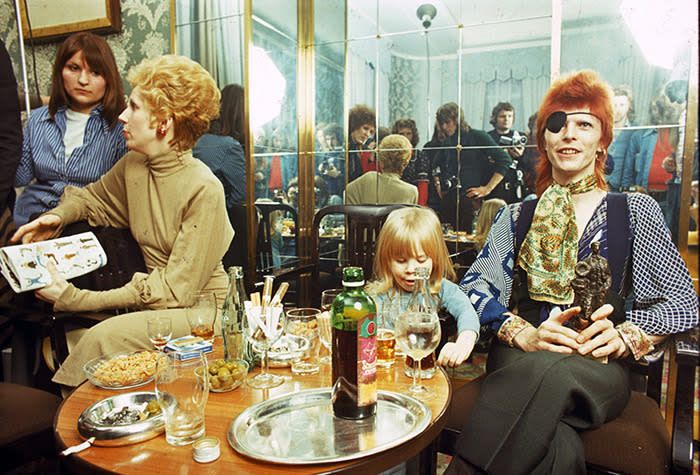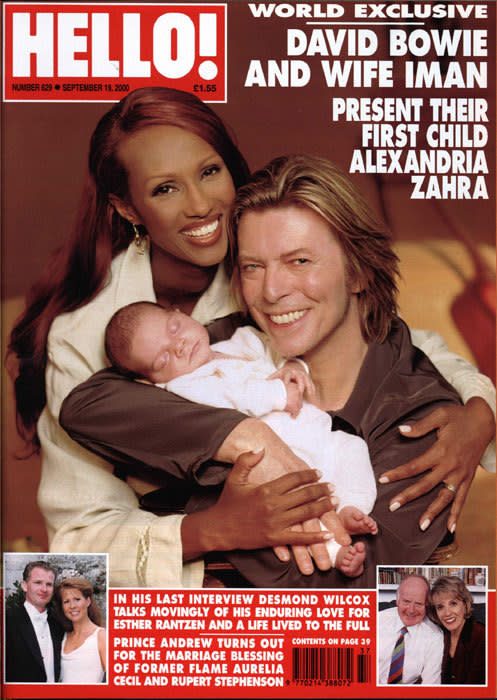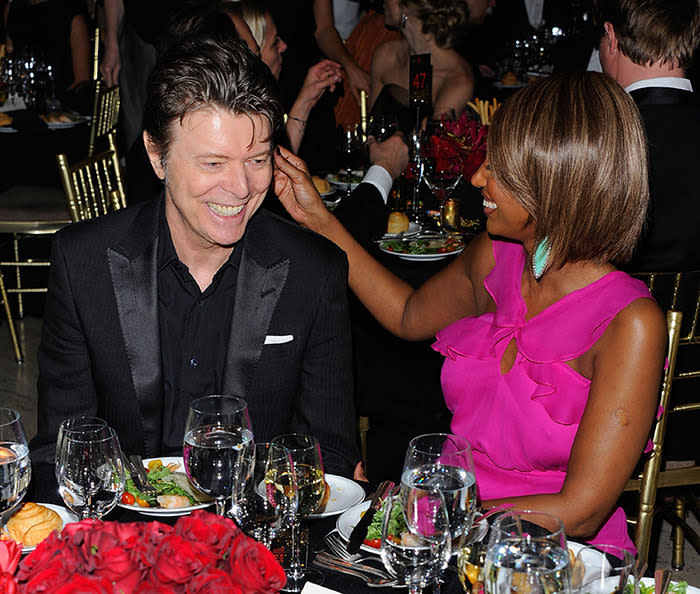David Bowie’s Death: When a Parent Leaves Kids Behind

David Bowie’s death on Monday at 69 represents a huge loss for the world — and a profound and all-encompassing void for his grieving family, including the star’s wife of 24 years, Iman, and his two children, Alexandria Zahra Jones, 15, and Duncan Jones, 44 (pictured above, with dad).
STORY: The Fallout After Dad’s Death Is Kept Secret From World Series Starting Pitcher
“Very sorry and sad to say it’s true. I’ll be offline for a while. Love to all,” tweeted Duncan, along with a black-and-white photo of himself as an infant on his dad’s shoulders. The English film director and producer is Bowie’s child from his first marriage, to Angela Bowie, which ended in divorce in 1980.
STORY: Anchor’s Touching Facebook Tribute to Dad
Alexandria is the child of Bowie and Iman, who married in 1992, not long after Bowie said he fell for the model turned philanthropist instantly and admitted to “naming the children the first night we met.” In a family interview with Hello! magazine shortly after Alexandria’s arrival, Iman called the days of welcoming their new addition “the happiest of times in my life.” She also noted, “We’ve always been very close, but if it’s possible, we’ve been drawn even closer. There’s a joy or a contentment that’s almost palpable to both of us. Overnight, our lives have been enriched beyond belief.”

Duncan with Dad. (Photo: Duncan Jones/Twitter)
The icon’s family broke the news of his death from an undisclosed form of cancer on his official Facebook page, announcing, “David Bowie died peacefully today surrounded by his family after a courageous 18 month battle with cancer. While many of you will share in this loss, we ask that you respect the family’s privacy during their time of grief.”
Iman (who also has a daughter 22 years older than Alexandria with ex-husband Spencer Haywood, a former basketball pro) was 45 when she happily and unexpectedly became pregnant with Alexandria. “People talk about the miracle of birth. No. There’s the miracle of conception,” she told People in 2009.

Bowie with a young Duncan, middle, and ex-wife Angela Bowie, second from left. (Photo: Getty Images)
“I did IVF, but nothing happened. So I began to think of adoption and then I got pregnant. It was definitely a miracle.”
Iman also talked about how different motherhood was the second time around. With her first daughter, she said, “I was at the height of my career … and I took her with me around the world. Then I had to root her in school. It was difficult to leave her behind.” Regarding then-8-year-old Alexandria, she added, “Now this one thinks she has it tough because both her old parents are at home with her all the time. When Lexi was about 4, she first saw a picture of David as Ziggy Stardust. ‘Why is his hair orange?’ she wanted to know. The makeup didn’t faze her.”

Alexandria and Iman. (Photo: Splash News)
Although Alexandria lives her life out of the public eye and has not tweeted or made any other social media declarations of grief, she clearly must be devastated by the loss of her father. “Teenagers hurt as much as anyone hurts, but teens also have all that noise going on in their minds,” David Kessler, a grieving expert, author, and founder of Grief.com, tells Yahoo Parenting. “They are at the age of trying to differentiate themselves from their parent, so such a death can become very confusing for the teen.”

Announcing the birth of Alexandria in Hello! magazine. (Photo: Hello!)
Particularly at 15, he says, “there are distortions around grief. It’s an age where you’re much more self-centered [than adults], so you tend to think things like, ‘Why did he leave me? Why did he abandon me?’” Teens are also desperate to fit in with their peers, so having a parent die could compound that anxiety, as it’s something that could have them be perceived as different.
“It’s hard to know where she was at with him,” notes Kessler, who has no personal knowledge of the teen or her family. “She could have been at a very rebellious stage, or she could have been very close. Either way, you’re not emotionally prepared to lose a parent at that age, because you’re not done formulating yourself.” For teens and those around teens, he advises, “Know their grieving won’t look like an adult’s. I always say, ‘A teenager in grief looks like a teenager’” — in other words, possibly angry or stoically hidden. “Just trust their grief will find them when it needs to.”

Bowie and Iman. (Photo: Getty Images)
For Alexandria’s older half brother Duncan, grief could present itself differently, though not necessarily less painfully, Kessler notes. “Sometimes we have these assumptions that losing a parent shouldn’t impact you as much as an adult. And while a parent dying is in a strange way a right of passage, a parent is still sort of the one thing between us and everything else,” he explains. “Some people report feeling orphaned and alone in the world in ways they didn’t imagine.”
That can come as a shock, because, he says, “on one hand, you are older and can likely handle things better. But on the other hand, this is someone who has been in your life for 44 years, so it seems impossible they’d be gone.” So even though adult children know, intellectually, that parents will die, they often don’t quite believe it until it happens. “So we kind of minimize what the adult child goes through,” he notes, advising that adult kids don’t compare their grief to others’ grief and that they find their own ways to say goodbye.
Finally, Kessler says, losing a parent who is a celebrity can make the blow even bigger. “David Bowie is out in the world, he is part of our culture, so he’s even more entrenched in everyone’s lives,” he says. “It’s just a deep shock for such an icon to not be there anymore.”
(Top photo: Getty Images)
Please follow @YahooParenting on Facebook, Twitter, Instagram, and Pinterest. Have an interesting story to share about your family? Email us at YParenting (at) Yahoo.com.



